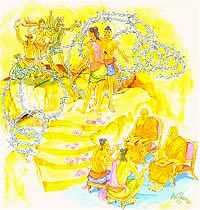22 02 2012 LESSON 532 The Dhammapada Verses
and Stories Dhammapada Verse 78
Channatthera Vatthu In The Company Of The Virtuous
FREE ONLINE eNālandā Research & Practice UNIVERSITY & BUDDHIST GOOD NEWS LETTER Through :http://sarvajan.ambedkar.org
THE BUDDHIST ON LINE GOOD NEWS LETTER
COURSE PROGRAM
LESSONS 532
Practice a Sutta a Day Keeps Dukkha Away

Verse 78. In The Company Of The Virtuous
Don’t go around with evil friends,
with rogues do not resort.
Spend your time with noble friends,
and worthy ones consort.
Explanation: Do not associate with people who
have evil ways. Avoid the company of wicked, evil people who are mean and bad.
Associate with worthy friends. Keep the company of noble persons who are
superior in quality and virtue and who will be able to elevate you.
Dhammapada Verse 78
Channatthera Vatthu
Na bhaje papake mitte
na bhaje purisadhame
bhajetha mitte kalyane
bhajetha purisuttame.
Verse 78: One should not associate with bad
friends, nor with the vile. One should associate with good friends, and with
those who are noble.
1. namayanti: to bend, to incline a
person’s heart or will. In the case of fletchers, to make the arrows straight;
in the case of carpenters, to make the timber into things that people want, by
cutting, sawing and planing.
The Story of Thera Channa
While residing at the Jetavana monastery, the
Buddha uttered Verse (78) of this book, with reference to Thera Channa.
Channa was the attendant who accompanied
Prince Siddhattha when he renounced the world and left the palace on horseback.
When the prince attained Buddhahood, Channa also became a bhikkhu. As a
bhikkhu, he was very arrogant and overbearing because of his close connection
to the Buddha. Channa used to say, “I came along with my Master when he left
the palace for the forest. At that time, I was the only companion of my Master
and there was no one else. But now, Sariputta and Moggallana are saying, ‘we
are the Chief Disciples,’ and are strutting about the place.”
When the Buddha sent for him and admonished
him for his behaviour, he kept silent but continued to abuse and taunt the two
Chief Disciples. Thus the Buddha sent for him and admonished him three times;
still, he did not change. And again, the Buddha sent for Channa and said, “Channa,
these two noble bhikkhus are good friends to you; you should associate with
them and be on good terms with them.”
Then the Buddha spoke in verse as follows:
|
Verse 78: One should not associate with bad friends, nor with |
In spite of repeated admonitions and advice
given by the Buddha, Channa did as he pleased and continued to scold and abuse
the bhikkhus. The Buddha, knowing this, said that Channa would not change
during the Buddha’s lifetime but after his demise (parinibbana) Channa
would surely change. On the eve of his parinibbana, the Buddha called
Thera Ananda to his bedside and instructed him to impose the Brahma-punishment
(Brahmadanda) to Channa; i.e., for the bhikkhus to simply ignore him and
to have nothing to do with him.
After the parinibbana of the Buddha, Channa,
learning about the punishment from Thera Ananda, felt a deep and bitter remorse
for having done wrong and he fainted three times. Then, he owned up his guilt
to the bhikkhus and asked for pardon. From that moment, he changed his ways and
outlook. He also obeyed their instructions in his meditation practice and soon
attained arahatship.
Pradip Kumar Maitra, Hindustan Times
Nagpur, February 19, 2012
The increasing might of Bahujan Samaj Party (BSP) and the virtual fall
of Republican Party of India (RPI) in its stronghold in Vidarbha,
particularly in Nagpur have raised many eyebrows in the region after
the local bodies’ elections.
Nagpur has been the citadel of RPI where Dr
Babasaheb Ambedkar converted to Buddhism in 1956 but the BSP has dealt
a severe blow to their vote bank in the recent elections.
BSP earned 12 seats in the Nagpur Municipal Corporations alone while 6
seats in the neighbouring Amravati municipal corporation and their
candidates finished second in 30 wards, giving a threat to the RPI
politicians. Moreover, the party got one seat in Akola Municipal
Corporation elections.
In Nagpur, it got 10 seats from north and south Nagpur assembly
constituencies—predominantly dalit areas which are considered as RPI
citadel and dalit voters are the deciding factor for the state
elections.
In Akola, where Dr Babasaheb Ambedkar’s grandson Dr Balasaheb Ambedkar
has a considerable clout, the party could manage to win only seven
seats and the BSP also made its presence felt in the elections.
The BSP also fared well in entire Vidarbha’s Zilla Parishad elections
and emerged as the top party for Dalits and backward classes by
winning eleven seats while all RPI factions could manage to win only
nine seats.
Milind Pakhale, chief of RPI (Ambedkar) in Nagpur, admitted that the
traditional RPI factions have lost their credibility among the voters
because of their hobnobbing with the ruling class as well as the
saffron combine which was cleverly used by the BSP in the region.
“We are assessing the entire issue and would rectify our mistakes.
This was lesson for us in our stronghold and we would certainly work
to reclaim our share of votes in the next elections,” he said.
Nagpur has been a significant power base of RPI where they ruled the
civic body for several years but all the three RPI factions could
manage only four seats. RPI (Kawade ) failed to win a single seat
while Prakash Ambedkar faction got two while former state Maharashtra
minister Sulekha Kumbhare and Ramdas Athavale factions received a seat
each.